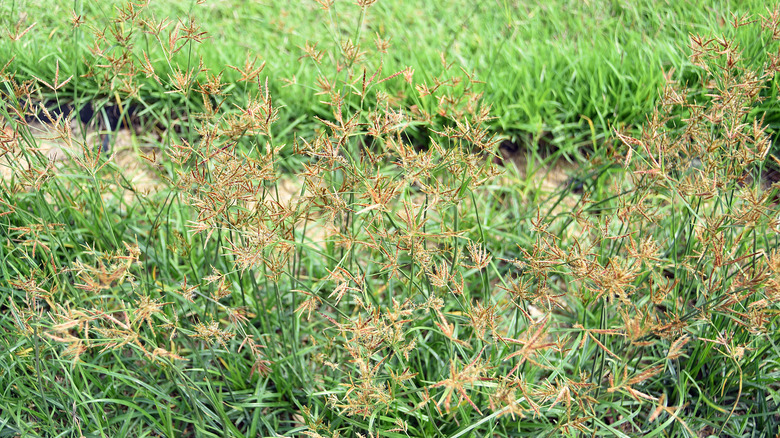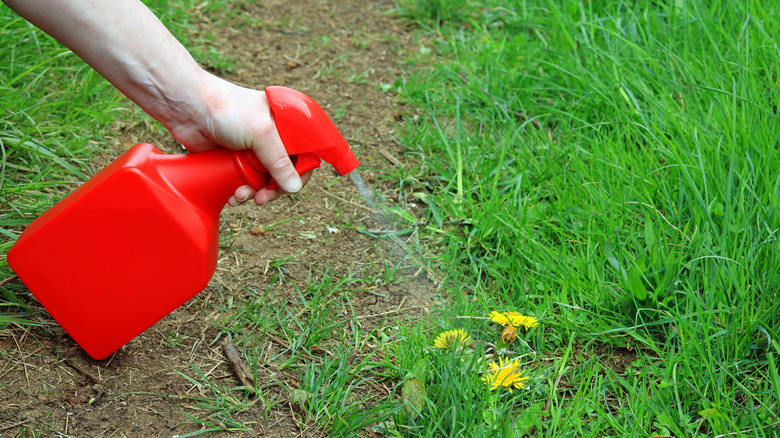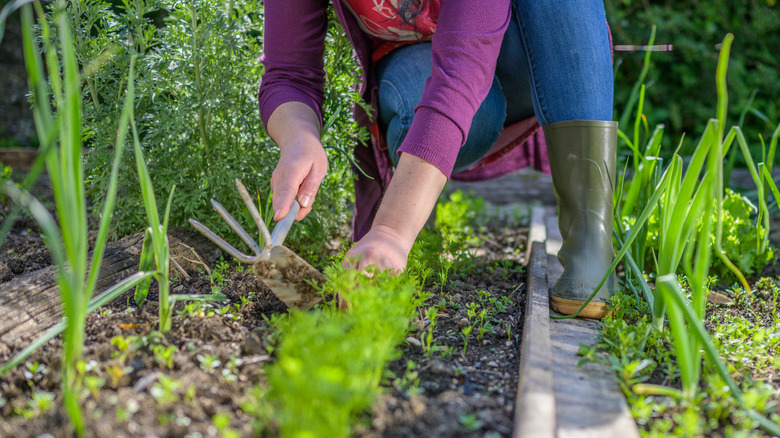Should You Use Vinegar To Get Rid Of Unsightly Nutsedge?
We may receive a commission on purchases made from links.
A perennial concern among gardeners and homeowners working diligently to ensure their lawns remain lush and tidy is weeds. Nutsedge stands out among the most prominent, troublesome weed varieties around. Nutsedge, often colloquially known as nutgrass, is a persistent and formidable weed that can wreak havoc in gardens and lawns. As homeowners grapple with the challenge of eradicating nutsedge, some turn to unconventional methods, such as vinegar. But the burning question remains: Should you consider vinegar as a viable solution for eliminating this pesky weed? Our short answer here is: Yes. However, there are certain factors you also need to consider.
Understanding the nuances of nutsedge is crucial in determining effective eradication methods. Unlike common weed grasses, nutsedge belongs to the Cyperaceae or sedge family, characterized by triangular stems and a rapid growth pattern. The fact that nutsedge is not an actual grass but a sedge makes it exceptionally resilient against traditional grass-killing herbicides. What makes nutsedge especially troublesome is its ability to outcompete desirable plants for nutrients and water, thriving in moist, poorly drained soils. Recognizable by its glossy leaves and distinctive triangular stem, nutsedge is a formidable foe for gardeners seeking to create a pristine and flourishing landscape.
Using vinegar to eliminate nutsedge
Vinegar or acetic acid is a natural remedy for killing weeds, including nutsedge. Aim for a concentration of around 15% or more to use vinegar effectively in eradicating nutsedge. Put some in a spray bottle and apply it to the nutsedge, ensuring thorough coverage. The acidity disrupts the plant's cell structure, leading to desiccation and eventual death. An alternative method would be adding some liquid dish soap into the mix to emulsify it and ensure the solution sticks to the weeds longer. You may also consider adding some salt to the solution to enhance the dehydrating properties of the vinegar.
However, it's important to note that vinegar is most effective on younger nutsedge plants, and repeated applications may be necessary. It's also recommended to use it with other strategies, like hand-pulling dried-out nutsedge and spot-treating any regrowth with the vinegar spray. Exercise caution during application to avoid harming surrounding plants, as vinegar can have a non-discriminatory impact. This is also why experts recommend using this vinegar solution exclusively in areas where only nutsedge and other weeds are growing.
When using a vinegar solution for nutsedge removal, wear protective gear such as gloves and goggles, and apply the solution on a calm day to prevent drift. Note, however, that vinegar may not be the panacea you seek, especially if nutsedge already proliferates in your property. Consider its limitations and explore alternative solutions for comprehensive nutsedge removal.
Effective alternatives for nutsedge removal
While vinegar may work as a temporary solution against nutsedge, it's recommended you consider other approaches and more effective and sustainable options for a well-rounded and enduring strategy in managing nutsedge and other types of weeds in your garden or lawn. Manual removal, involving digging out the nutsedge and its tubers that run quite deep, remains a reliable approach for smaller infestations. This physically eliminates the weed and disrupts its growth cycle. You can also use sugar or horticultural molasses, like Medina Horticultural Molasses, available at Walmart for $32.87 (one gallon), or RAW Cane Molasses, priced at $66.64 for a two-pound pack at Amazon, as excellent alternatives to vinegar.
Applying these to the affected area promotes microbial activity in the soil, suppressing nutsedge growth. By enhancing microbial competition over soil nutrients, sugar or molasses reduce the availability of nutrients for nutsedge. The organic nature of this approach makes it environmentally friendly. Unlike vinegar, which may have limited effectiveness on mature nutsedge, these alternatives offer a broader range of control without harming desirable plants, including the grass in your lawn. Other methods you can try or combine with different strategies to get rid of nutsedge include smothering the weeds using landscape fabric, applying boiling water, mulching, and mowing your grass high.


